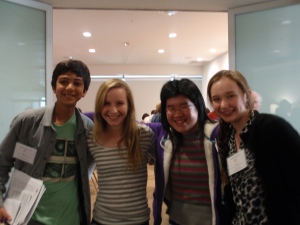By Carole Rosner
Every gifted person has a unique story. The following story is part of a series of posts depicting the many faces of gifted by highlighting gifted children and adults we have found through IEA programs. The Caroline D. Bradley Scholarship program – mentioned in this story – awards highly gifted applicants with a four-year scholarship to a high school that fits their individual, intellectual and personal needs.
Valerie D.
Caroline D. Bradley Scholar
Class of 2010
IEA’s Caroline D. Bradley (CDB) Scholarship was created with kids like Valerie Ding in mind.
As a high school sophomore, Valerie has already found her own success. “I particularly appreciate the vast number of rigorous, advanced science and math courses that my school offers, and I can’t express how much I enjoy being able to interact with a diverse group of intellectual and hard-working peers (two other CDB Scholars, for example) on a daily basis. Every class is an absolute pleasure to take part in, and the flourishing clubs and activities have really helped me realize who I fundamentally am. As the student leader of Mu Alpha Theta, Math Team, and Science Olympiad, I can confidently say that my school—and, of course, the Caroline D. Bradley Scholarship itself—has allowed me to make a much bigger impact in my community.”
Valerie learned about IEA through her middle school teachers. “As a seventh grader, I was taking math classes at the local high school and participating in many extracurricular activities such as science fairs, Science Bowl, MathCounts, and the American Math Contests—not to mention piano. In addition, I was a prolific reader, and book assessments were often my favorite assignments to do. Simply put, I had a wide range of interests and was always eager to pick up something new. My teachers noticed all this and suggested that I look into the CDB Scholarship. Needless to say, I’m forever grateful for their encouragement.”
Piano and physics comprise a big part of Valerie’s life. “In middle school, I was a big fan of energy technology. For example, I built my own hydrogen fuel cell out of plastic containers, salt and water, and a bit of platinum-coated wire; I attached my fuel cell to a tiny solar cell to create a primitive energy storage device. But when my school allowed me to take a physics course at the local high school, I discovered something amazing in the back of the textbook: quantum physics. While we never covered the topic in class, I was drawn to the seemingly unpredictable, volatile quantum world (in retrospect, my attraction to quantum physics may have been borderline obsession). That was the start of a long journey that I still continue to this day: applying quantum physics to energy technology.”
“I play the piano because it serves as my daily catharsis, and it’s a way for me to escape and go into my own little world,” Valerie explains of her other passion. One would think science and music are very different, but not to Valerie. “On the surface—yes, they are drastically different. But fundamentally, both share the theme of continuity. At the basic level, science is discrete; it explains how atoms and molecules interact, how biological organisms operate and coexist, and how physical phenomena occur. But when we dig deeper, we find counterintuitive concepts such as an electron being a particle and a wave simultaneously, and we discover that not everything is as simple as we think. Music, on the other hand, is the art of producing sounds that are pleasing or therapeutic, or perhaps convey sorrow or internal chaos. To sum up, music and science are both ways to make sense of our surroundings and tell that story to other people.”
Valerie has been competing in Science Fairs for many years and earned a top spot at last year’s Intel International Science and Engineering Fair (Intel ISEF). That prize awarded Valerie and 11 other students a trip to Switzerland to visit CERN (the European Organization for Nuclear Research.). “For a week during the summer, we flew to Geneva and toured the campus, discussed theoretical physics and particle accelerator mechanics with every scientist we could get, and even did a little sightseeing. What really makes my experience unique was that we were at CERN just one week before the Higgs boson announcement! That was huge.”
I asked Valerie what she thought about the perception that there aren’t as many girls pursuing science as there are boys. “I think it’s a mindset. Just recently, I participated in a workshop on gender equality and representation, and we discussed a TED talk by Sheryl Sandberg (the COO of Facebook) on how women have so many mental barriers (mostly family and child issues) that simply aren’t conducive to success in competitive business. The idea is that women are molded into the subconscious line of thought that they just aren’t expected to perform as well as their male counterparts.” Valerie goes on to say, “I don’t know if I agree with this, but it’s a thought. Luckily, however, there are national programs to recognize and encourage women that are pursuing scientific, mathematical, and technological endeavors—this, at least, is a step forward.”

It’s clear the Caroline D. Bradley Scholarship has benefitted Valerie in many ways. In addition to giving her the financial freedom to attend the private high school where she thrives, the award has given her a network of peers that are as passionate about the world as she is. She recently met the other CDB Scholars in San Jose at the annual Bradley Seminar. “The Seminar was a wonderful, wonderful experience. Hearing from all the seniors was truly heartwarming and enlightening, and meeting my fellow Scholars (many for the first time) was just so invigorating.”
Do you know a gifted 7th grader who is looking for a high school that will meet his or her intellectual and personal needs? Applications for the 2013 Caroline D. Bradley Scholarship will be accepted until May 6!

